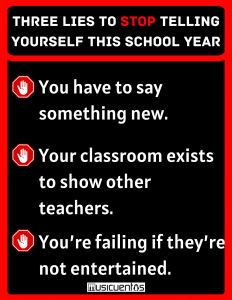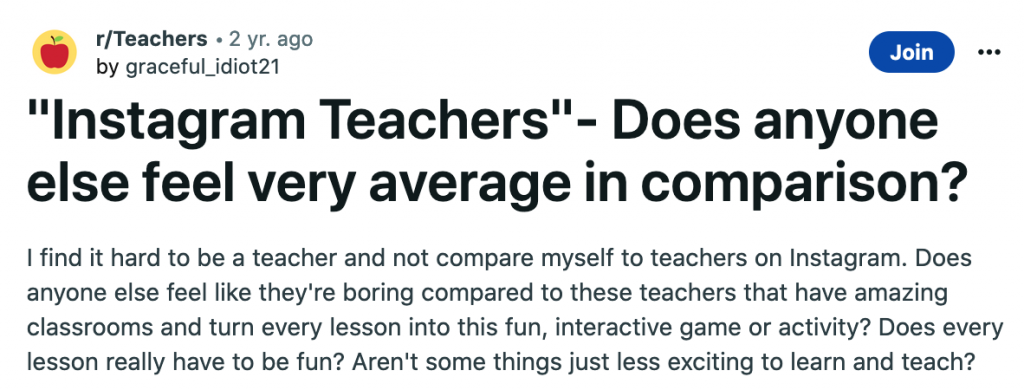This is the journey of teachers – another set of graduates moved on, another crop of kindergarteners coming in, another summer gone, another year just around the bend. Perhaps you’ve moved schools, or grades, or classrooms. Perhaps you’re making a really big change like when I was first asked to teach preschoolers when all of my training was in secondary education. Whatever your story is this year, I pray it’s full of beauty, mercy, healthy energy, kindness, and clarity.
Can I help with the clarity?
As we start yet another school year, let me offer a few words on three lies every language teacher should stop believing this year.

1. Lie: Say something new.
Truth: Say something real.
It’s almost conference season. I’m headed to the Kentucky conference to present on “i+1 and the Five C’s” in September (and yes, I will blog on this). Then, in November I’ll head to Chicago with my Ohio friend Haylee for ACTFL. We’re presenting “Teaching on TL Memory Lane,” a session on memory research and how it should affect our curriculum and lesson planning.
Yes, our session was accepted to ACTL (and last year it wasn’t) and I can tell you mainly why – conferences, especially the big, competitive ones, are looking for teachers to say something new. I get it, I really do, but it perpetuates this deceptive sense that if you don’t have something new to say, you don’t have anything valuable to say.
Really, I don’t know anyone who would outright say that. But between the conference sessions, the proliferation of resources, and the broad, loud, talented field of world language consultants out there, it can get intimidating. We’ve put people on a pedestal because they said something new to us, and we’ve let it silence us because we feel we can’t do the same.
You know I’d love to meet you on Twitter, or X, or whatever they’re calling it these days. I’d love for you to start a blog because it’s an amazing way to publicly talk through all the things you’re learning, as well as the problems that are challenging you. If you’ve been held back from doing these things because you think you don’t have something to “add” to the conversation, you’ve bought the lie that you have to say something new or stay quiet.
My dear teacher, new teacher, seasoned teacher, tired teacher, ready-to-retire teacher, energizer bunny teacher – don’t worry about saying something new. Just say something real. To your students, to yourself, to us.
2. Lie: Your classroom exists primarily to show to other teachers.
Truth: The hearts in your seats matter; the hearts on your posts do not.
It’s that time of year when social media is going to ramp up with posts of teachers’ Target deals haul, fabulous bulletin boards, first-day outfits.
Instagram is lying to us. We know it. And we still buy this lie, that our classroom, even our clothing, is not quite enough unless we can broadcast it to the world and get enough hearts, enough thumbs-up, enough comments praising our fashion and shopping strategies.
If you found great stuff at Dollar Tree, that’s great. If you are still loving the thing that was the big thing five years ago and isn’t “Insta-worthy,” that’s even better – look at the money you’re saving. If you don’t spend a cent on a fancy TPT bulletin board setup and instead staple up some authentic resources from a trip to the Hispanic foods store, step back and admire it! Can I encourage you this year to focus more on the hearts in your classroom than the hearts on social media posts about it?
3. Lie: You’re failing if they’re not entertained.
Truth: Be pleasant and kind, and that’s enough.
Spanish teacher-author A.C. Quintero said this first and better in a recent absolutely dynamite post, so I’ll start by linking it here. It rang so true; I was reminded how much we buy the lie that ends up “privileging entertainment over education” and I knew I had to include it here.
Really, go read her post.
If you’ve been anywhere on the conference circuit, you’ve seen some really entertaining teacher-trainers. Some of the best TPRS teacher-trainers are so much fun to watch. They’re high-energy, they’re creative, and they’re effective. If you’re not careful, you’ll come away thinking that you have to dial up the entertainment factor or your learners will not be acquiring language. But don’t let yourself believe this lie! You can’t let someone else’s God-given personality dictate how you present input to your learners. You’re the person in front of them every day, not that trainer.
One of the most highly respected TPRS trainers, Donna Tatum-Johns, lives and teaches in the city where I live. She’s a classy, down-to-earth, effective realist of a teacher. Something she has said has stuck with me over the years: your job is to make your classroom pleasant, not fun. Fun and pleasant are not the same thing.
Yes, learners have to pay attention in order to acquire language. But in the end, whether or not they pay attention is entirely their own responsibility. Do not take the responsibility for their attention; that’s a soul-sucking lie that will defeat you. If you stand up in front of them and present and guide with kindness and a pleasant atmosphere, that’s enough. Feeding the dopamine hit of constant entertainment may seem to work, and it may get you points with families and administrators, but in the end, it’s sending our education system down a dangerous road. One might say we’re amusing ourselves to death.
Have a great year, teacher! Truth be told, it’ll be even greater if you can reject the deception swirling around us and believe that you can say what’s real even if it’s not new, focus on the real hearts in your real learners instead of Insta-approval, and be content to be kind instead of lamenting that you can’t compete with Taylor Swift and Tik Tok.




Very well said–and this needed to be said. Thank you Sara Elizabeth. 🙂
Thanks – great to “see” you, Greta!
[…] you that your job is to teach, and not to entertain. I’ll reiterate (and you can follow this link to read the brief-ish post) that in the end, whether or not learners pay attention is entirely […]